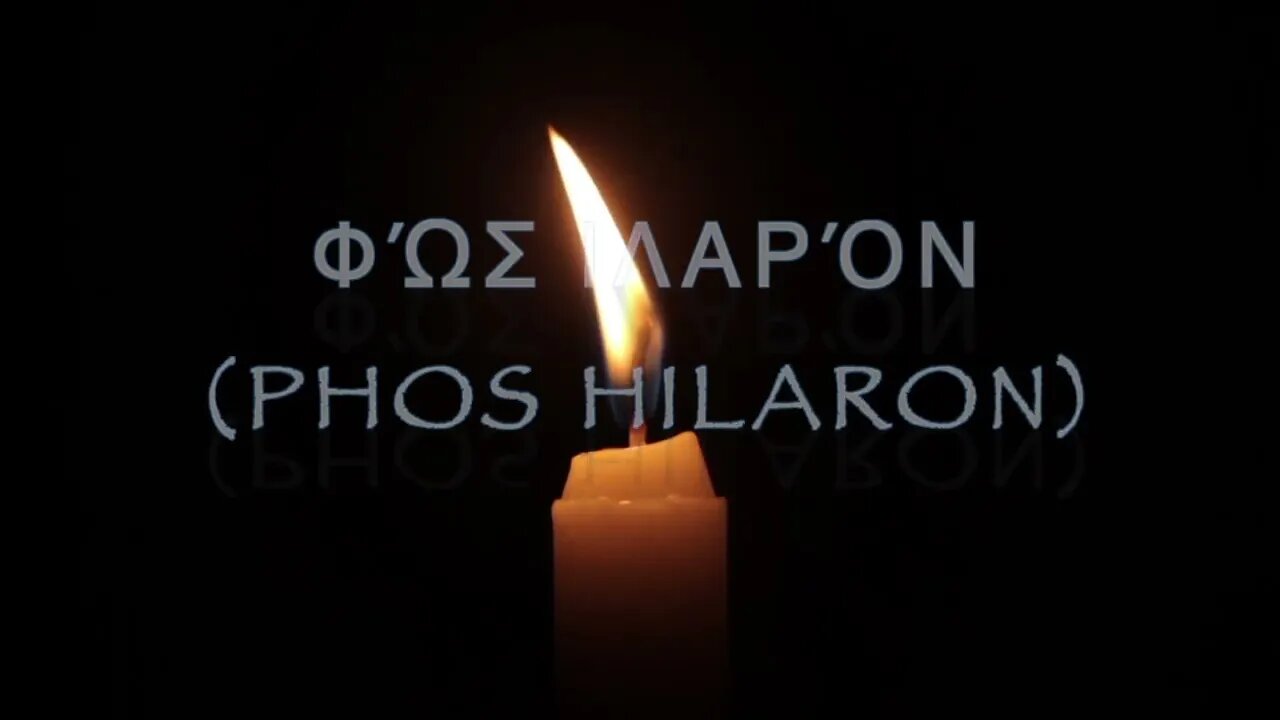Premium Only Content

Phos Hilaron (Φώς Ιλαρόν, O Gladsome Light) | Cinematic Orthodox
This hymn, one of the most ancient of Christian hymns,
Titled in Greek “Phos Hilaron,” it speaks of Jesus Christ, who is the “radiance (or brightness) of the Father’s glory” (Hebrews 1:3) and who is also the “true Light” who is and always has been “in the world,” enlightening “every man coming into the world” (Gospel of John, Prologue, chapter 1). The hymn mentions that as we see the setting of the earthly sun, we also apprehend spiritually the Light of evening, that is, the “light of the world” which “shines in the darkness” of the present world (John 1:5, John 8:12, 12:46, Matthew 4:16), the Light which is life and in whom we have life: Jesus Christ (John 1:4). This is linked at once with mention of our worship of the Trinity, or Three—“Father, Son, and Holy Spirit, God”—because it is in and through Christ, the Son of God, that we have truly come to know the Father and the Holy Spirit. The hymn concludes by noting that such worship is fitting “at all times,” because Christ is the “Son of God and giver of life”—for which reason alone all the world glorifies Him.
Thus, at the beginning of each day, at prayer, we acknowledge that we have seen Christ, the “light of evening,” the true light. Yet this acknowledgement is again echoed at the highest point of each day, the highest point of our prayer, at the reception of Holy Communion in the Divine Liturgy, when we sing, “We have see the true light . . .” As at vespers, the words are again linked at once with the worship of the Holy Trinity: “worshipping the undivided Trinity, who has saved us.”
Thus at vespers, we see Christ, the light of evening and we worship the Trinity; at the Divine Liturgy—in the Holy Eucharist—we repeat those actions, but also go further: we taste of him, we partake of him, and are saved by the Trinity, to Whom we are united through the reception of the Body and Blood of Christ.
Furthermore, in the language of the Church, our entire life is often compared to a single day. Thus at the beginning of our life, we behold Christ the Light, but at the highest point of the day (which is one moment in time, but a moment that unites us to Eternity and to Immortality) we are joined to the Light and are saved by Him.
Thus our words at vespers in the hymn “O Gladsome Light” and at the Divine Liturgy in the hymn “We have seen the True Light” are more truly observations about our entire life, our life has a whole, rather than of one brief moment of that life.
For having come, in our life, in the darkness of the life we knew before we knew the true Light, Christ—having come to the setting of the earthly sun—the setting within us of the light of this world—and having beheld Him who is the “light of evening” and believed—we have now been joined to the “day without evening”—eternal life with Christ, who is “Lord of the Light that knows no evening.”
#greekorthodox #orthodoxy #light
-
 1:02:38
1:02:38
Donald Trump Jr.
6 hours agoNew Year’s Terror, Latest Breaking News with Sebastian Gorka | TRIGGERED Ep.204
103K180 -
 LIVE
LIVE
The StoneZONE with Roger Stone
2 hours agoAfter Years of Targeting Trump, FBI and DOJ are Unprepared to Stop Terror Attacks | The StoneZONE
1,628 watching -
 LIVE
LIVE
Leonardaisfunny
34 minutes agoH-1b Visas: Infinity Indians
439 watching -
 LIVE
LIVE
Josh Pate's College Football Show
5 hours ago $0.07 earnedPlayoff Reaction Special: Ohio State Owns Oregon | Texas Survives | UGA vs Notre Dame Takeaways
172 watching -
 58:04
58:04
Kimberly Guilfoyle
5 hours agoFBI's Terror Response Failures, Live with Steve Friend & Kyle Seraphin | Ep. 185
76.9K35 -
 2:15:01
2:15:01
WeAreChange
5 hours agoMassive Developments In Vegas Investigation! UNREAL DETONATION, Shocking Details Emerge!
76.1K19 -
 54:02
54:02
LFA TV
12 hours ago2025 Is Off to a Violent Start | TRUMPET DAILY 1.2.25 7pm
18K -
 59:27
59:27
theDaily302
11 hours agoThe Daily 302- JJ Carrell
20.3K2 -
 2:57
2:57
EvenOut
1 day ago $1.28 earnedTHE TELEPORTING PORTA POTTY TWIN RPANK!
23K -
 1:02:55
1:02:55
In The Litter Box w/ Jewels & Catturd
1 day agoAmerica Is Under Attack! | In the Litter Box w/ Jewels & Catturd – Ep. 711 – 1/02/2025
88.1K111